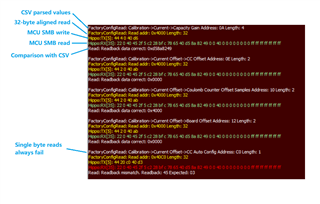Hi,
We are developing a tool to program our devices on the production line. It perform the following sequence:
- Read the gg.csv file exported by Battery Management Studio with our final configuration
- Read the data flash from the device using the block read command (0x44)
- If the values don't match, write the new values
We have observed the following:
- All block reads are 32 bytes
- Block reads work perfectly for any register longer than one byte.
- All single byte register reads fail. They seem incompatible with block read.
- I can't find any reference in the register guide to dataflash "word read". It covers word write and block read/write.
- Note the sequence below is missing the second 0x44 byte issued before the read starts.



